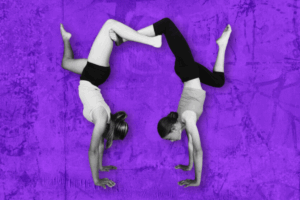WORDS: Madhavi Nawana Parker, Director at Positive Minds Australia.
Parents, this caring for and raising other people thing can be a tough gig. We love our children so much and what a precious and wonderful gift they are. For the sacrifices we make to tend to them, we gain love, wisdom, purpose, resilience, courage, psychological flexibility, perspective and much more.
Amongst all the gains (and it’s mostly gains), there are also losses. Those moments we’re at capacity, trying to respond to and meet the competing demands of our lives – and their lives. Moments of overwhelm and desperation for a moment alone or uninterrupted time with another adult. That longing for an actual day off you don’t use for chores, getting your children to appointments or recovering from a cold or flu.
I’ll spare you the oxygen mask analogy but you know it’s true. Every parent who comes to me mad at themselves for being mad at their kids, isn’t putting their oxygen mask on first. They’re putting everyone else first (and suffering because of it).
Your state of mind and your health are the best gift you can give your family.
Building in small, frequent bursts of effective, personalised and ‘doable’ Wellbeing tools into your day – every day – will help you avoid burnout. Without Wellbeing, you’ll feel exhausted, overwhelmed and maybe even a little grumpy.
Wellbeing is a lifelong commitment and process, growing with time, practice, encouragement and self-compassion.

Here are some ideas to get you started:
- Find a hobby. Remember having a hobby when you were a kid or young adult pre kids? Hobbies allow you to engage your mind in something that sends you into a state of flow (a wellbeing state where you fully immerse yourself in what you’re doing – and because you’re loving it so much, time passes quickly and happily.
- Give up as much of what’s not useful, helpful or causing stress as you can and replace it with things that are useful, helpful and joyful.
- Practice Gratitude. It works. Think of three things that went well during the day. This helps the stressed, negativity part of your brain settle down and allows the more poised and hopeful mindset emerge.
- Pay attention to your thoughts and feelings. Next time you’re struggling, ask yourself, ‘What am I feeling right now?’ Acknowledge that feeling, accept it and then do one small thing that brings you joy to help move the feeling through constructively. (That could be watching something funny, reading a couple of pages of a book or magazine you love, playing your favourite song or having a cup of tea).
- Rest. I know how hard this is – especially when they’re little and you’re sleep deprived and rest is going to the bathroom while they sleep. But it’s important to rest.
- Move. This doesn’t have to mean going to the gym or doing yoga (nothing against either of them – I love and do both) but find your way that you like to move that works for you. Movement helps discharge stress from your body and improves wellbeing.
- Congratulate yourself. Write yourself a list of all the things about yourself that inspire you. If this makes you cringe, pair up with another parent (preferably one you know 😉) and do this for each other. We often focus so much on what’s on our to-do list and celebrate everyone but ourselves…it’s important to celebrate your ‘done’ list.
- Listen to music. Whack it on from the start of the day when you get up and keep it on as much as possible. Listen to your favourite songs. Singing along is great for your state of mind and happiness. For those of you with little ones at home, having your music in the background (or on your airpods) can be energising and uplifting.
- Laugh. Listen to funny stuff, watch funny stuff, talk about funny stuff.
- Be intentionally kind. Our wellbeing improves when we extend out towards something meaningful that’s bigger than ourselves. Being kind to others feels good for the giver and the receiver.
- Watch TV. You read that right. I’m recommending TV…Netflix…Movies. Stepping away from your real life, into someone else’s pretend life, can help you relax and escape, enhancing your wellbeing. Immersing yourself in a great book can do this for you too.
- Hang out with friends. This can be hard when you have young children – or a child who struggles with their social and emotional skills. Parenting can be isolating. It’s important to have your ‘people’ and be one of those people who welcome and include others – especially the ones who have children who struggle that don’t get many invitations. Try and find help where you can or exchange babysitting with friends so you can go out and connect with other adults. If you aren’t hugely social, then use this time to connect with things you love and care about – or to relax alone.
- Get it out of your head and onto paper, through journaling. Uncomfortable thoughts and worries often hang around and churn around if they’re not given safe passage. Releasing them out of your mind and onto paper can help stop or at least reduce the cycle of overthinking.
Wellbeing is a skill that takes time to grow through daily habits. As parents, you can’t do this alone and at different seasons of parenting it will be more difficult. With the support of family, friends and your community I hope you can make time for your wellbeing.
Love,
Madhavi Nawana Parker






